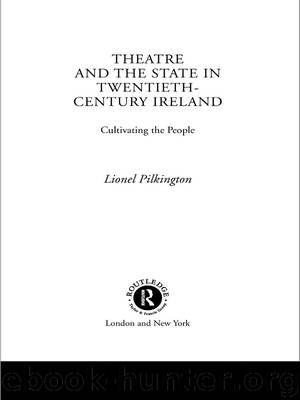Theatre and the State in Twentieth-Century Ireland by Pilkington Lionel

Author:Pilkington, Lionel [LIONEL PILKINGTON]
Language: eng
Format: epub
Publisher: Taylor & Francis (CAM)
Published: 2011-07-31T16:00:00+00:00
Corkery’s argument was that Irish literary expression was asymmetrical in relation to Ireland’s majority culture because Anglo-Irish literature (or Irish literature in English) was written in English (not Irish) and because it was out of touch with the pieties of Roman Catholicism. He noted that much Anglo-Irish literature was written for a foreign audience and from a position distanced from the majority indigenous population. It was not so much that Anglo-Irish writers were to be condemned as individuals, but that the ‘system’ and the critical values of literature itself gave rise to a pattern of endemic distortion (Corkery 1931: 39). For many of the country’s Catholic intellectuals, Corkery’s thesis had an important appeal. It attempted to address the way in which Ireland’s recent literary expression took an overwhelmingly oppositional stance in relation to the country’s majority opinion. Corkery’s book also reflects a general unease about modernist cultural practices in general: a sense that the cult of aesthetic autonomy was a subterfuge for an irresponsible lack of social accountability.5
As far as the Abbey Theatre is concerned, however, the radical nature of Corkery’s theory lay in its challenge to one of the NTS’s long-standing first principles: that a national theatre’s prestige is inextricably linked to the ability of its dramatic narratives to offer a criticism of majority orthodoxies from a minority position. Corkery argued that so pervasive and widely accepted was this assumption that even the plays of Catholic dramatists, such as T. C. Murray or Padraic Colum, were distanced from the majority culture of their upbringing and so portrayed obsessively ‘the crassness [of an Irish] upbringing’ (Corkery 1939: 15). While one implication of Corkery’s argument was the need for a redefinition of literary and cultural prestige in a post-colonial context, Corkery opted for the less radical choice of advocating a national literature primarily concerned with the expression of more authentic and ‘hidden’ values: Irishness as an adherence to the pieties of land, nationalism and the dominant religion. Because these values are presented in such a way that the terms ‘Irish’ and ‘Roman Catholic’ are regarded as virtual synonyms, Corkery’s work gained a contemporary reputation, even among his supporters, as right wing and exclusive (see Irish Press, 2 March 1937: 8).
These were serious weaknesses. Nevertheless, as an alternative theory of national literature, Corkery’s Synge and Anglo-Irish Literature drew widespread public attention to the cultural asymmetries at the Abbey Theatre and helped promote a debate about the accountability of cultural institutions in general. Thus, Aodh de Blacam, writing in a 1935 issue of the Irish Monthly, acknowledges Ireland’s debt to the early work of the Abbey Theatre in stirring national pride and in promoting ‘high and consistent standards in literature,’ but then goes on to argue that the Abbey is out of tune with modern Irish life. It is not just a question of the clichéd nature of the NTS’s peasant play tradition (‘ “Kiltartenese” ’ as a ‘tedious mannerism fit only to be caricatured by Jimmy O’Dea’), but the more fundamental issue
Download
This site does not store any files on its server. We only index and link to content provided by other sites. Please contact the content providers to delete copyright contents if any and email us, we'll remove relevant links or contents immediately.
Aircraft Design of WWII: A Sketchbook by Lockheed Aircraft Corporation(32191)
The Great Music City by Andrea Baker(31250)
Call Me by Your Name by André Aciman(20350)
The Secret History by Donna Tartt(18808)
The Art of Boudoir Photography: How to Create Stunning Photographs of Women by Christa Meola(18504)
Shoot Sexy by Ryan Armbrust(17637)
Plagued by Fire by Paul Hendrickson(17314)
Portrait Mastery in Black & White: Learn the Signature Style of a Legendary Photographer by Tim Kelly(16933)
Adobe Camera Raw For Digital Photographers Only by Rob Sheppard(16881)
Photographically Speaking: A Deeper Look at Creating Stronger Images (Eva Spring's Library) by David duChemin(16599)
Ready Player One by Cline Ernest(14494)
Pimp by Iceberg Slim(14320)
Bombshells: Glamour Girls of a Lifetime by Sullivan Steve(13952)
The Goal (Off-Campus #4) by Elle Kennedy(13471)
Art Nude Photography Explained: How to Photograph and Understand Great Art Nude Images by Simon Walden(12954)
Kathy Andrews Collection by Kathy Andrews(11709)
The Priory of the Orange Tree by Samantha Shannon(8858)
The remains of the day by Kazuo Ishiguro(8790)
Thirteen Reasons Why by Jay Asher(8767)
